初三英语总复习语法
- 格式:docx
- 大小:25.94 KB
- 文档页数:10
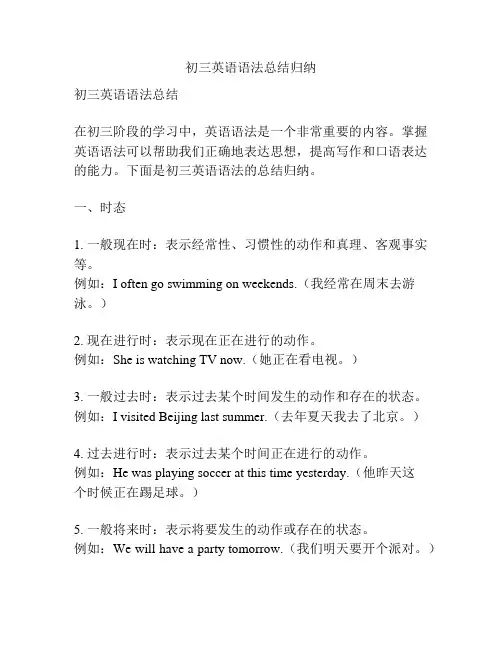
初三英语语法总结归纳初三英语语法总结在初三阶段的学习中,英语语法是一个非常重要的内容。
掌握英语语法可以帮助我们正确地表达思想,提高写作和口语表达的能力。
下面是初三英语语法的总结归纳。
一、时态1. 一般现在时:表示经常性、习惯性的动作和真理、客观事实等。
例如:I often go swimming on weekends.(我经常在周末去游泳。
)2. 现在进行时:表示现在正在进行的动作。
例如:She is watching TV now.(她正在看电视。
)3. 一般过去时:表示过去某个时间发生的动作和存在的状态。
例如:I visited Beijing last summer.(去年夏天我去了北京。
)4. 过去进行时:表示过去某个时间正在进行的动作。
例如:He was playing soccer at this time yesterday.(他昨天这个时候正在踢足球。
)5. 一般将来时:表示将要发生的动作或存在的状态。
例如:We will have a party tomorrow.(我们明天要开个派对。
)6. be going to + 动词原形:表示计划、打算要发生的动作。
例如:I am going to travel to Europe next year.(明年我打算去欧洲旅游。
)7. 现在完成时:表示过去发生的动作对现在的影响或结果。
例如:I have finished my homework.(我已经完成作业了。
)8. 过去完成时:表示过去某个时间或动作之前已经完成的动作。
例如:She had already left when I arrived.(我到达时她已经离开了。
)9. 将来完成时:表示将来某个时间之前已经完成的动作。
例如:By the end of this month, we will have finished the project.(到这个月底,我们将会完成这个项目。
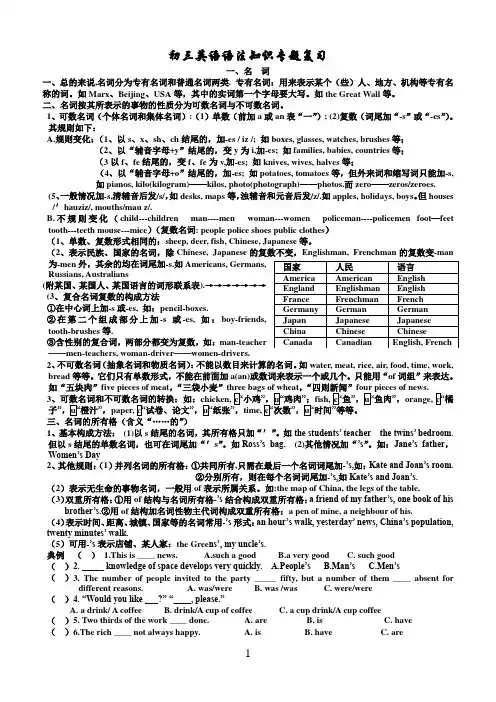
初三英语语法知识专题复习一、名 词一、总的来说,名词分为专有名词和普通名词两类. 专有名词:用来表示某个(些)人、地方、机构等专有名称的词。
如Marx 、Beijing 、USA 等,其中的实词第一个字母要大写。
如the Great Wall 等。
二、名词按其所表示的事物的性质分为可数名词与不可数名词。
1、可数名词(个体名词和集体名词):(1)单数(前加a 或an 表“一”); (2)复数(词尾加“-s ”或“-es ”)。
其规则如下:A.规则变化:(1、以s 、x 、sh 、ch 结尾的,加-es / iz /; 如boxes, glasses, watches, brushes 等;(2、以“辅音字母+y ”结尾的,变y 为i,加-es; 如families, babies, countries 等;(3以f 、fe 结尾的,变f 、fe 为v,加-es; 如knives, wives, halves 等;(4、以“辅音字母+o ”结尾的,加-es; 如potatoes, tomatoes 等,但外来词和缩写词只能加-s,如pianos, kilo(kilogram)——kilos, photo(photograph)——photos.而zero ——zeros/zeroes.(5、一般情况加-s,清辅音后发/s/,如desks, maps 等,浊辅音和元音后发/z/.如apples, holidays, boys 。
但houses /′hauziz/, mouths/mau z/.B.不规则变化(child---children man----men woman---women policeman----policemen foot —feet tooth---teeth mouse---mice )(复数名词: people police shoes public clothes )(1、单数、复数形式相同的:sheep, deer, fish, Chinese, Japanese 等。
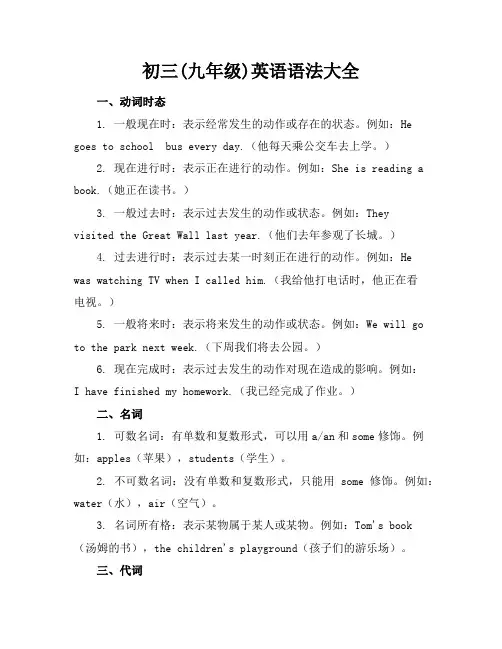
初三(九年级)英语语法大全一、动词时态1. 一般现在时:表示经常发生的动作或存在的状态。
例如:He goes to school bus every day.(他每天乘公交车去上学。
)2. 现在进行时:表示正在进行的动作。
例如:She is reading a book.(她正在读书。
)3. 一般过去时:表示过去发生的动作或状态。
例如:Theyvisited the Great Wall last year.(他们去年参观了长城。
)4. 过去进行时:表示过去某一时刻正在进行的动作。
例如:He was watching TV when I called him.(我给他打电话时,他正在看电视。
)5. 一般将来时:表示将来发生的动作或状态。
例如:We will go to the park next week.(下周我们将去公园。
)6. 现在完成时:表示过去发生的动作对现在造成的影响。
例如:I have finished my homework.(我已经完成了作业。
)二、名词1. 可数名词:有单数和复数形式,可以用a/an和some修饰。
例如:apples(苹果),students(学生)。
2. 不可数名词:没有单数和复数形式,只能用some修饰。
例如:water(水),air(空气)。
3. 名词所有格:表示某物属于某人或某物。
例如:Tom's book(汤姆的书),the children's playground(孩子们的游乐场)。
三、代词1. 人称代词:I(我),you(你/你们),he(他),she(她),it(它),we(我们),they(他们)。
2. 物主代词:my(我的),your(你的/你们的),his(他的),her(她的),its(它的),our(我们的),their(他们的)。
3. 指示代词:this(这个),that(那个),these(这些),those(那些)。

初三英语中考重点语法:一、时态1.一般现在时-用法:表示经常发生的动作或存在的状态;表示客观事实、真理等。
-标志词:always, usually, often, sometimes, every day/week/month/year 等。
-结构:主语+动词原形(当主语为第三人称单数时,动词用第三人称单数形式)。
2.一般过去时-用法:表示过去某个时间发生的动作或存在的状态。
-标志词:yesterday, last week/month/year, ago, in +过去的年份等。
-结构:主语+动词的过去式。
3.一般将来时-用法:表示将来某个时间要发生的动作或存在的状态。
-标志词:tomorrow, next week/month/year, in the future 等。
-结构:will +动词原形;be going to +动词原形。
4.现在进行时-用法:表示现在正在进行的动作。
-标志词:now, at the moment, look, listen 等。
-结构:be +动词的现在分词。
5.过去进行时-用法:表示过去某个时刻正在进行的动作。
-标志词:at that time, at +过去的时间点等。
-结构:was/were +动词的现在分词。
6.现在完成时-用法:表示过去发生的动作对现在造成的影响或结果;表示从过去一直持续到现在的动作或状态。
-标志词:already, yet, just, ever, never, since +时间点,for +时间段等。
-结构:have/has +动词的过去分词。
二、被动语态1.一般现在时的被动语态:am/is/are +过去分词。
2.一般过去时的被动语态:was/were +过去分词。
3.一般将来时的被动语态:will be +过去分词;be going to be +过去分词。
4.现在完成时的被动语态:have/has been +过去分词。
三、宾语从句1.引导词:that(在口语或非正式文体中可省略),if/whether(是否),特殊疑问词(what, who, when, where, why, how 等)。
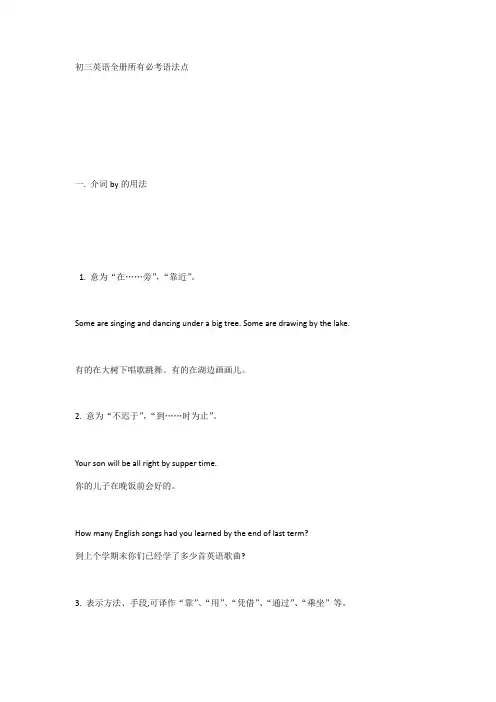
初三英语全册所有必考语法点一. 介词by的用法1. 意为“在……旁”,“靠近”。
Some are singing and dancing under a big tree. Some are drawing by the lake. 有的在大树下唱歌跳舞。
有的在湖边画画儿。
2. 意为“不迟于”,“到……时为止”。
Your son will be all right by supper time.你的儿子在晚饭前会好的。
How many English songs had you learned by the end of last term?到上个学期末你们已经学了多少首英语歌曲?3. 表示方法、手段,可译作“靠”、“用”、“凭借”、“通过”、“乘坐”等。
The monkey was hanging from the tree by his tail and laughing.猴子用尾巴吊在树上哈哈大笑。
The boy’s father was so thankful that he taught Edison how to send messages by railway telegraph.孩子的父亲是那么的感激,于是他教爱迪生怎样通过铁路电报来传达信息。
4. 表示“逐个”,“逐批”的意思。
One by one they went past the table in the dark.他们一个一个得在黑暗中经过这张桌子。
5. 表示“根据”,“按照”的意思。
What time is it by your watch?你的表几点了?6. 和take , hold等动词连用,说明接触身体的某一部分。
I took him by the hand.我拉住了他的手。
7. 用于被动句中,表示行为主体,常译作“被”、“由”等。
English is spoken by many people.英语被许多人说。

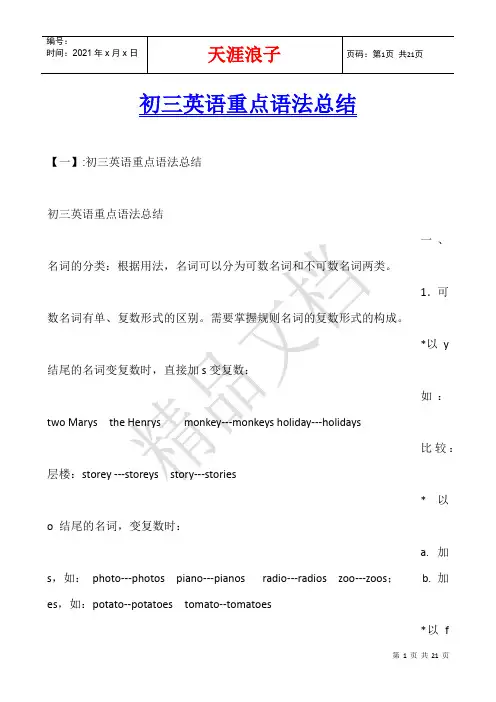
初三英语重点语法总结【一】:初三英语重点语法总结初三英语重点语法总结一、名词的分类:根据用法,名词可以分为可数名词和不可数名词两类。
1.可数名词有单、复数形式的区别。
需要掌握规则名词的复数形式的构成。
*以y 结尾的名词变复数时,直接加s变复数:如:two Marys the Henrys monkey---monkeys holiday---holidays比较:层楼:storey ---storeys story---stories* 以o 结尾的名词,变复数时:a. 加s,如:photo---photos piano---pianos radio---radios zoo---zoos;b. 加es,如:potato--potatoes tomato--tomatoes*以f或fe 结尾的名词变复数时常去f , fe 加ves ,如:half---halves knife---knives leaf---leaves wife---wives life---lives thief---thieves2.名词复数的不规则变化1)child---children foot---feet tooth---teeth mouse---mice man---menwoman---women注意:与man 和woman构成的合成词,其复数形式也是-men 和-women。
如:an Englishman,two Englishmen. 但German不是合成词,故复数形式为Germans;Bowman是姓,其复数是the Bowmans。
2)单复数同形如:deer,fish,Chinese,Japanese li,jin,yuan,two li,three mu,four jin 但除人民币元、角、分外,美元、英镑、法郎等都有复数形式。
如:a dollar, two dollars; a meter, two meters3)以s结尾,仍为单数的名词,如:a.maths ,politics,physics等学科名词,为不可数名词,是单数。
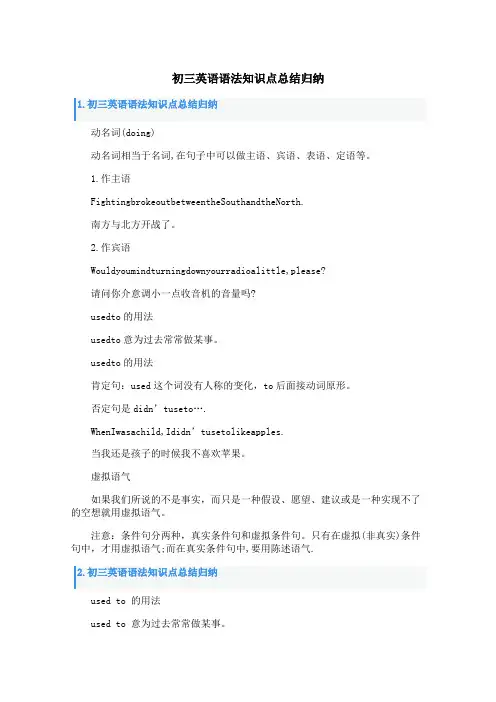
初三英语语法知识点总结归纳1.初三英语语法知识点总结归纳动名词(doing)动名词相当于名词,在句子中可以做主语、宾语、表语、定语等。
1.作主语FightingbrokeoutbetweentheSouthandtheNorth.南方与北方开战了。
2.作宾语Wouldyoumindturningdownyourradioalittle,please?请问你介意调小一点收音机的音量吗?usedto的用法usedto意为过去常常做某事。
usedto的用法肯定句:used这个词没有人称的变化,to后面接动词原形。
否定句是didn’tuseto….WhenIwasachild,Ididn’tusetolikeapples.当我还是孩子的时候我不喜欢苹果。
虚拟语气如果我们所说的不是事实,而只是一种假设、愿望、建议或是一种实现不了的空想就用虚拟语气。
注意:条件句分两种,真实条件句和虚拟条件句。
只有在虚拟(非真实)条件句中,才用虚拟语气;而在真实条件句中,要用陈述语气.2.初三英语语法知识点总结归纳used to 的用法used to 意为过去常常做某事。
used to 的用法1. 肯定句:used这个词没有人称的变化,to后面接动词原形。
否定句是didn’t use to….When I was a child, I didn’t use to like apples.当我还是孩子的时候我不喜欢苹果。
疑问形式是Did you use to…?Where did you use to live before you came here?当你来这儿之前你住哪儿?2. 含有used to 的句子的反意疑问句不要usedn’t + 主语,而用didn’t + 主语。
——He used to smoke, didn’t he?——他过去常常吸烟,是吗?Yes, he did./ No, he didn’t.是的,他吸。
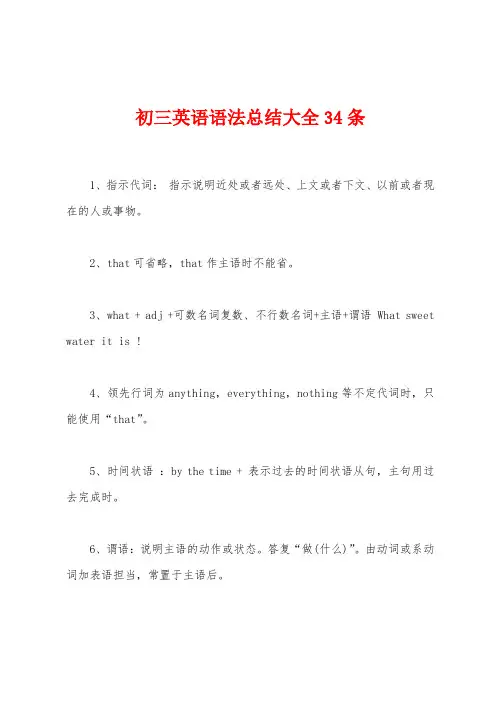
初三英语语法总结大全34条1、指示代词:指示说明近处或者远处、上文或者下文、以前或者现在的人或事物。
2、that可省略,that作主语时不能省。
3、what + adj +可数名词复数、不行数名词+主语+谓语 What sweet water it is !4、领先行词为anything,everything,nothing等不定代词时,只能使用“that”。
5、时间状语:by the time + 表示过去的时间状语从句,主句用过去完成时。
6、谓语:说明主语的动作或状态。
答复“做(什么)”。
由动词或系动词加表语担当,常置于主语后。
7、表语:用以表述主语的特征、状态、身份等。
答复是“什么”或者“怎么样”。
一般由名词或形容词担当,置于系动词或be动词之后。
8、几个用定冠词的习语:at the same time (与此同时),make the bed(铺床),in the end(最终),all the time(始终),by the way(顺便说一下),on the way(在路上)等等。
9、副词→连词,如:when(什么时候)→(当……时候),等等。
10、表感官的动词: feel, smell, taste, sound, look, appear, seem 等。
11、假如主句用现在的某个时态,宾语从句视实际状况而定。
12、专出名词是个别的人、地、物、团体、机构等的专用名称。
13、物主代词:说明事物所属关系的代词,分为形容词性和名词性两种。
14、英语可数名词的单复数:英语可数名词有单数和复数两种形式。
15、先行词被the only,the very,the same,the last修饰时,只能使用“that”。
16、合成法:如:spaceship, headache, basketball, playground 等等。
17、不定代词:代替或修饰不特指的人或事物的代词叫不定代词。
18、百位与十位之间要加and;十万位和万位,亿位和千万位之间通常也要加and。
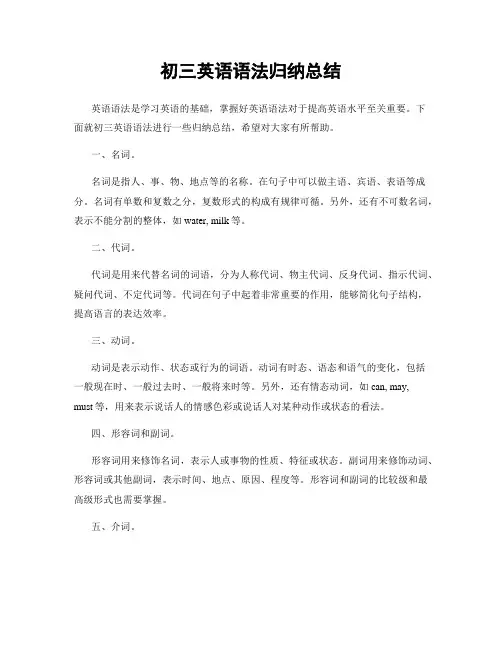
初三英语语法归纳总结英语语法是学习英语的基础,掌握好英语语法对于提高英语水平至关重要。
下面就初三英语语法进行一些归纳总结,希望对大家有所帮助。
一、名词。
名词是指人、事、物、地点等的名称。
在句子中可以做主语、宾语、表语等成分。
名词有单数和复数之分,复数形式的构成有规律可循。
另外,还有不可数名词,表示不能分割的整体,如water, milk等。
二、代词。
代词是用来代替名词的词语,分为人称代词、物主代词、反身代词、指示代词、疑问代词、不定代词等。
代词在句子中起着非常重要的作用,能够简化句子结构,提高语言的表达效率。
三、动词。
动词是表示动作、状态或行为的词语。
动词有时态、语态和语气的变化,包括一般现在时、一般过去时、一般将来时等。
另外,还有情态动词,如can, may, must等,用来表示说话人的情感色彩或说话人对某种动作或状态的看法。
四、形容词和副词。
形容词用来修饰名词,表示人或事物的性质、特征或状态。
副词用来修饰动词、形容词或其他副词,表示时间、地点、原因、程度等。
形容词和副词的比较级和最高级形式也需要掌握。
五、介词。
介词用来表示名词或代词与其他词之间的关系,常用的介词有in, on, at, with, to, for等。
介词短语在句子中起着非常重要的连接作用,能够使句子更加连贯和丰富。
六、连词。
连词用来连接词、短语或句子,使句子结构更加完整。
常见的连词有and, but, or, so, because等。
掌握好连词的用法能够帮助我们更好地表达自己的意思。
七、冠词。
冠词是用来限定名词的词语,包括定冠词和不定冠词。
定冠词包括the,不定冠词包括a和an。
冠词在句子中的位置和用法需要我们仔细加以区分和掌握。
总结起来,初三英语语法的归纳总结包括名词、代词、动词、形容词和副词、介词、连词和冠词等方面的内容。
只有对这些基础知识有一个清晰的认识和掌握,才能够在英语学习中更上一层楼。
希望大家能够认真学习和掌握这些内容,提高自己的英语水平。
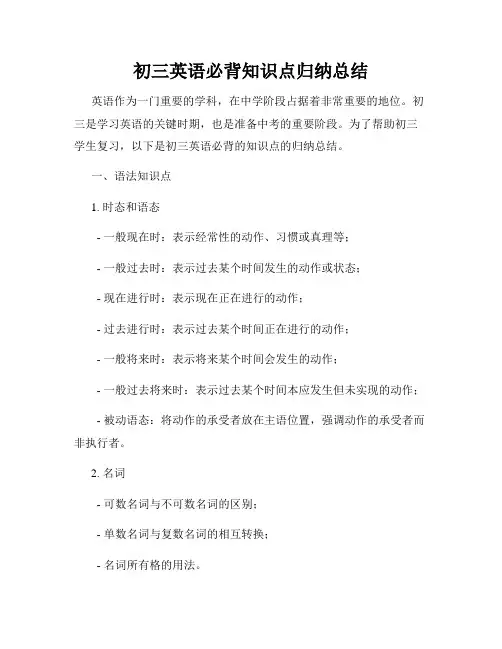
初三英语必背知识点归纳总结英语作为一门重要的学科,在中学阶段占据着非常重要的地位。
初三是学习英语的关键时期,也是准备中考的重要阶段。
为了帮助初三学生复习,以下是初三英语必背的知识点的归纳总结。
一、语法知识点1. 时态和语态- 一般现在时:表示经常性的动作、习惯或真理等;- 一般过去时:表示过去某个时间发生的动作或状态;- 现在进行时:表示现在正在进行的动作;- 过去进行时:表示过去某个时间正在进行的动作;- 一般将来时:表示将来某个时间会发生的动作;- 一般过去将来时:表示过去某个时间本应发生但未实现的动作;- 被动语态:将动作的承受者放在主语位置,强调动作的承受者而非执行者。
2. 名词- 可数名词与不可数名词的区别;- 单数名词与复数名词的相互转换;- 名词所有格的用法。
3. 代词- 人称代词、物主代词、反身代词的用法;- 指示代词和疑问代词的用法。
4. 形容词和副词- 形容词和副词的基本用法;- 比较级和最高级的构成方式;- 不规则比较级和最高级的形式;- 形容词和副词的修饰范围。
5. 介词和介词短语- 常见的介词及其用法;- 介词短语在句子中的作用。
6. 动词- 不同类型动词的用法,包括实义动词、系动词、情态动词等; - 动词的时态和语态。
7. 数词和量词- 基数词和序数词的用法;- 量词的用法。
8. 并列连词和从属连词- 并列连词的分类和用法;- 从属连词的分类和用法。
9. 特殊句型- 倒装句的形式和用法;- 感叹句的形式和用法;- 条件句和虚拟语气的用法;- 宾语从句和主语从句的用法;- 直接引语和间接引语的转换。
二、词汇知识点1. 同义词和反义词- 同义词:指意义相同或相近的词语;- 反义词:指意义相反的词语。
2. 高频词汇- 常见的高频词汇,包括常用动词、形容词、副词、名词等; - 常用短语和固定搭配。
三、阅读技巧1. 阅读理解题- 不同类型的阅读题目,包括事实细节、主旨大意、推理判断等; - 阅读题目的解题技巧和答题方法。
初三英语语法总结Unit11. by + doing 通过……方式如:by studying with a groupby 还可以表示:"在…旁","靠近","在…期间"、"用,""经过","乘车"等如:I live by the river. I have to go back by ten o'clock.The thief entered the room by the window.The student went to park by bus.2. talk about 谈论,议论,讨论如:The students often talk about movie after class. 学生们常常在课后讨论电影。
talk to sb. === talk with sb. 与某人说话3. 提建议的句子:①What/ how about +doing sth.? 如:What/ How about going shopping?②Why don't you + do sth.? 如:Why don't you go shopping?③Why not + do sth. ? 如:Why not go shopping?④Let's + do sth. 如:Let's go shopping⑤Shall we/ I + do sth.? 如:Shall we/ I go shopping?4. a lot 许多常用于句末如:I eat a lot. 我吃了许多。
5. too…to 太…而不能常用的句型too+adj./adv. + to do sth.如:I'm too tired to say anything. 我太累了,什么都不想说。
初三英语重点语法总结初三英语重点语法总结一、动词时态和语态1. 一般现在时:表示经常性、习惯性的动作或真理。
结构:主语 + 动词原形Eg. She usually goes to school by bus.2. 一般过去时:表示过去某个时间发生的动作或存在的状态。
结构:主语 + 动词过去式Eg. They watched a movie last night.3. 现在进行时:表示现在正在进行的动作。
结构:主语 + be动词(am/is/are) + 动词-ing形式Eg. She is reading a book now.4. 过去进行时:表示过去某个时间正在进行的动作。
结构:主语 + 过去式be动词(was/were) + 动词-ing形式Eg. They were playing football yesterday afternoon.5. 现在完成时:表示过去某个时间开始一直延续到现在的动作或已完成的动作。
结构:主语 + have/has + 过去分词Eg. We have finished our homework.6. 过去完成时:表示过去某个时间或动作发生在另一个过去的时间或动作之前。
结构:主语 + had + 过去分词Eg. He had already left when I arrived.7. 将来时:表示将来某个时间要发生的动作或存在的状态。
结构:主语 + will/shall + 动词原形Eg. They will go hiking next weekend.8. 过去将来时:表示过去某个时间本来可以实现的行动或状态。
结构:主语 + should/would + 动词原形Eg. He said he would help me with my homework.9. 被动语态:表示动作的承受者是主语,动作的执行者不重要或未知。
结构:主语 + be动词 + 过去分词Eg. The letter was written by him.二、名词1. 可数名词:可以用数目词来修饰和计数的名词。
2024年初三英语总复习大纲一、语法复习1. 时态:一般现在时、一般过去时、一般将来时、现在进行时、过去进行时、过去将来时、过去完成时、现在完成时等。
2. 名词:可数名词、不可数名词、复数形式等。
3. 冠词:定冠词、不定冠词、零冠词等。
4. 代词:人称代词、物主代词、反身代词、指示代词、不定代词等。
5. 动词:及物动词、不及物动词、动词的时态、语态等。
6. 形容词和副词:形容词的比较级和最高级、副词的比较级和最高级等。
7. 连词:并列连词、从属连词等。
8. 介词:表示时间、地点、方式等的介词。
9. 句子结构:陈述句、疑问句、祈使句、感叹句等。
10. 直接引语和间接引语。
二、词汇复习1. 高频词汇复习,包括常用名词、动词、形容词、副词等。
2. 词组和固定搭配的复习,如常用的短语动词、习惯搭配等。
三、阅读理解复习1. 阅读理解题型的分析和解题技巧。
2. 不同类型文章的阅读技巧,如记叙文、说明文、议论文等。
3. 阅读理解中常见的词汇和句型。
四、写作复习1. 书信写作:如求职信、道歉信、感谢信等。
2. 日记和文章写作:如描述人物、事件、景物等。
3. 图表写作:如图表描述和数据分析。
五、听力复习1. 听力题型的分析和解题技巧。
2. 听力材料中常见的词汇和句型。
六、口语复习1. 日常生活中常用的口语表达。
2. 各种情境下的口语交际技巧。
七、翻译复习1. 中英互译的常用表达。
2. 句子翻译和段落翻译的技巧。
以上为2024年初三英语总复习大纲,根据各个考点和题型进行系统复习,重点掌握语法、词汇、阅读理解、写作、听力、口语和翻译等方面的知识和技巧,以提高英语综合应用能力。
初三英语语法知识点总结归纳初三英语的语法知识点是英语学习的基础,以下是一些常见的初三英语语法知识点的总结和归纳:1. 动词时态:-一般现在时:用于表达习惯、常规或普遍事实。
-现在进行时:表示当前正在进行的动作。
-一般过去时:用于过去发生的动作或状态。
-过去进行时:表示过去某一时刻正在进行的动作。
-将来时:用于表示将来发生的动作或计划。
2. 情态动词:如can、could、may、might、will、would、shall、should、must等,用于表示能力、许可、建议、义务等情态。
3. 被动语态:用于强调动作的承受者,构成为“be + 过去分词”。
4. 条件句:-第一条件句(真实条件句):表示可能实现的条件和结果。
-第二条件句(虚拟条件句):表示不太可能实现的条件和结果。
-第三条件句(虚拟条件句):表示过去无法实现的条件和结果。
5. 定语从句:用于修饰名词的从句,关系代词包括who、which、whose、whom、that等。
6. 副词从句:用于修饰动词、形容词或副词的从句,常用引导词包括when、where、why、if、because等。
7. 名词性从句:从句在句中充当名词的角色,如主语从句、宾语从句、表语从句。
8. 形容词和副词比较级:用于表示比较程度,比如用more和most表示形容词和副词的比较级。
9. 直接和间接引语:用于引述别人的话,直接引语中使用引号,间接引语中改变时态和人称。
10. 冠词:不定冠词(a/an)用于泛指,定冠词(the)用于特指,零冠词用于泛指或抽象名词。
11. 可数名词和不可数名词:可数名词可以单数和复数形式,不可数名词没有复数形式,表示不可分割的东西。
12. 形容词和名词的性数一致:形容词与名词在性别和数上要一致,如单数男性名词配合男性形容词。
13. 反身代词:用于表示某人做某事而影响到自己的代词,如myself、yourself、himself、herself、itself、ourselves、yourselves、themselves。
初三英语语法知识点总结归纳(优秀8篇)初三的英语学习是单词和语法的综合,你必须要把单词和语法一起拿下,考试的时候才能获得一个好分数。
这次帅气的为您整理了8篇《初三英语语法知识点总结归纳》,希望可以启发、帮助到大朋友、小朋友们。
初三英语语法知识点总结归纳篇一被动语态1.英语中动词有两种语态:主动语态和被动语态主动语态表示主语是谓语动词动作的执行者,被动语态表示主语是谓语动词动作的承受者。
当我们强调谁是某个动作的执行者,即"谁做了某种事情"时,用主动语态。
eg:Danielboughtanewputer丹尼尔买了一台新电脑。
(不是别人)如果主语不是动作的执行者,而是动作的承受者时,就是被动语态。
eg:AnewputerwasboughtbyDaniel一台新电脑被丹尼尔买了。
被动语态的谓语由be+动词的过去分词构成,其中be是助动词,随时态改变。
一般现在时的被动语态由"am/is/are+动词的过去分词"构成。
一般过去时的被动语态由"was/were+动词的过去分词"构成。
最新九年级英语语法知识点总结大全篇二语法:直接引语变间接引语。
直接引用别人的话叫直接引语,用来转述别人的话叫间接引语。
例:Hesaid,HewillgotoBeijingtomorrow.(直接引语)HesaidthathewouldgotoBeijingthenextday.直接引语变间接引语时时态、人称及一些时间或个别词都要做相应的改变。
①时态:一般现在时→一般过去时一般将来时→过去将来时现在进行时→过去进行时一般过去时→过去完成时现在完成时→过去完成时_真理性的句子时态不变。
例:Hesaid:Thesunrisesintheeast.Hesaidthatthesunrisesintheeast.他说太阳从东方升起。
②时间:now→then,lastmonth→themonthbefore.today→thatday,threedaysago→threedaysbefore.tonight→thatnight,tomorrow→thenextday.yesterday→thedaybefore,thedayaftertomorrow→intwodays.③其它变化:this→thatthese→thosehere→theree→go句式的改变:①直接引语是陈述句加that可以省去。
初三的英语语法知识点总结归纳英语作为一门重要的学科,语法是其基础和核心内容。
在初三阶段,学生需要全面掌握英语语法知识,以便正确运用语言表达自己的思想和理解他人的意思。
本文将对初三英语语法知识点进行总结归纳,帮助同学们快速复习和强化记忆。
一、词类与词性1. 名词(Noun):表示人、物、地点、抽象概念等。
2. 代词(Pronoun):代替名词,分为人称代词、物主代词、反身代词等。
3. 形容词(Adjective):修饰名词或代词,描述属性或特征。
4. 副词(Adverb):修饰动词、形容词和其他副词,表示程度、方式、时间等。
5. 动词(Verb):表示动作、状态或存在。
6. 介词(Preposition):表示位置、方向、时间、关系等。
7. 连词(Conjunction):连接词语、短语、从句等。
8. 冠词(Article):限定名词的用法,分为不定冠词(a/an)和定冠词(the)。
二、句子结构与语法规则1. 陈述句(Declarative Sentence):陈述一个事实或观点,语序为主语+谓语+宾语/补语。
2. 疑问句(Interrogative Sentence):用于提问,语序为助动词/特殊疑问词+主语+谓语+宾语/补语。
3. 祈使句(Imperative Sentence):表达命令、请求、建议等,语序为谓语+宾语/补语。
4. 感叹句(Exclamatory Sentence):表达强烈的感情或意见,语序为"What/how+adj./adv.!"。
5. 主谓一致:主语与谓语之间在人称、数上保持一致。
6. 定语从句(Adjective Clause):用来修饰名词或代词的从句,引导词有关系代词和关系副词。
7. 状语从句(Adverbial Clause):修饰动词、形容词和副词的从句,包括时间、地点、条件、原因等。
三、时态与语态1. 一般现在时(Simple Present):表示经常性、习惯性或普遍真理,动词原形。
十三、并列复合句1、基本概念:并列复合句是由两个或两个以上并列而又独立的简单句构成。
两个简单句常由并列连接词连在一起;但有时不用连接词,只在两个简单句之间用一逗号或分号。
2、常见的并列句:(1) 用来连接两个并列概念的连接词有and , not only…but also…, neither…nor…等,and所连接的前后分句往往表示先后关系、递进关系。
前后分句的时态往往保持一致关系,若第一个分句是祈使句,那么第二个分句用将来时。
(2) 表示在两者之间选择一个, 常用的连接词有or,otherwise,or else,either…or…等,前后分句的时态往往保持一致关系,若第一个分句是祈使句,那么第二个分句用将来时。
(3) 表明两个概念彼此有矛盾、相反或者转折, 常用的连接词有but,yet,still ,however等,前后分句时态一致。
(4) 说明原因, 用连接词for ,前后分句时态一致。
(5) 表示结果,用连接词so, 前后分句时态一致。
十四、主从复合句1、概念:主从复合句由一个主句和一个或一个以上的从句构成。
主句为句子的主体,从句只用作句子的一个次要成分,不能独立成为一个句子。
从句通常由关联词引导,并由关联词将从句和主句联系在一起。
如:While the grandparents love the children, they are strict with them.(爷爷奶奶们很爱孩子,同时对他们也严格要求。
) / It seemed as if the meeting would never end.(看起来会议没完没了。
) / Hurry up, or (else) you'll be late.(快点, 要不然就来不及了。
) / However I cook eggs, the child still refuses to eat them.(不管我用什么方法煮鸡蛋,小孩还是不肯吃。
)2、分类:从句按其在复合句中的作用,分为主语从句、表语从句、宾语从句、定语从句和状语从句等。
(参见以下各条)3、各从句在句子中的位置以及用法:(1) 表语从句:在句子中作连系动词的表语的从句,它位于主句中的系动词之后。
例如:That is why he did not come to school yesterday. / It is because you are so clever.(2) 宾语从句:在句子中作及物动词或介词的宾语。
①基本形式:(主句+)连词+从句主语+从句谓语+...②关于宾语从句连词的选择:若从句来源于一个陈述句,那么,连词用that,在口语中that可以省略;若从句来源于一个一般疑问句,连词则用if 或whether;若从句来源于一个特殊疑问句,则连词就是疑问词(如what,who,where,when等)例如:They believe that the computer will finally take the place of human beings.(他们相信计算机终将代替人类。
) (从句本来就是陈述句)/ I wonder whether I should say something for him to the headmaster. (我不知道是不是该为他在校长跟前说点什么。
) (从句来源于一般问句Shall I say something for him to the headmaster?) / He asked me where he could get such medicine. (他问我在哪儿能搞到那样的药。
) (从句来源于特殊问句Where can he get such medicine? )③宾语从句的时态问题:如果主句是现在时,从句则用现在某一时态,甚至可以用过去时;如主句是过去时,从句则相应地使用过去某一时态,遇到客观真理时仍然用现在时。
如:I think I will do better in English this term. (我想本学期我的英语会学得好点。
) / The teacher asked the boy if the earth is round. (老师问那个男孩地球是不是圆的。
)④下列结构后面的从句一般也作为宾语从句看待:be sorry / afraid / sure / glad +that从句,如:I’m sorry I’m late. (对不起,我迟到了。
) / I’m afraid he isn’t in at the moment. (恐怕他此刻不在家。
)(3) 状语从句:在复合句中作状语,其位置可以在主句前或主句后。
状语从句可以分为时间、地点、原因、目的、结果、比较、让步、条件等几种。
状语从句由从属连接词引导。
时间状语从句通常由when ,as ,while, after, before, since, as soon as ,since, till (until), while,whenever 等引导。
时间状语从句一般放在句首或句尾,特别注意,时间状语从句不允许使用将来时,而应该用现在时替代。
如:When you finish the work, you may go out to play with Sam. (你完成工作就可以出去和Jim一起玩了。
) / I won’t leave until Mum comes back. (妈妈回来了我才会走。
)地点状语从句通常由where, wherever等引导。
如:Go back where you came from! (哪里来还滚到哪里去!) / I will never forget to catch the thief who stole my necklace wherever he may be. (我永远也不会忘记去抓住那个偷我项链的贼,无论他会在哪里。
)原因状语从句通常由because, since, as等引导,一般放在句首或句尾。
如:He went abroad because his father had found a good university for him. (他出国了,因为他父亲给他找了一所好大学。
)目的状语从句通常由so that..., so...hat..., in order that... 等引导,往往放在句尾,从句中通常含有can / could / may / might等情态动词。
如:He got up earlier so that he could catch the first train. (他起身更早为的是赶上第一班车。
)结果状语从句通常由so that..., so...that... 等引导,放在句尾。
结果状语从句一般表示已经发生的事情,故多为过去时态。
如:He lost so many bikes that he decided never to buy a new one. (他丢了那么多辆自行车,他决定再也不买新车了。
)比较状语从句通常由as, than, as (so)...as等引导,一般省略从句的谓语部分,只剩下名词或代词(用主格或宾格均可)。
如:Jane is much taller than I/me. (Jane比我高多了。
) / I don’t have as many books as you (do). (我书没有你多)让步状语从句通常由though (although), as, even if( even though), however, whatever等引导。
如:Even if you pay the debt(债务) for me, I will not thank you because it has nothing to do with me. (即使你替我还了债我也不会感谢你,因为它与我毫无关系。
) / He wears a T-shirt though it is very cold. (他穿了一件T恤衫,尽管天很冷。
)条件状语从句通常由if, unless, as long as等引导,条件状语从句一般放在句首或句尾,特别注意,时间状语从句不允许使用将来时,而应该用现在时替代。
You will certainly fail in the coming final exams unless you work much harder. (即将来到的期末考试你肯定考不及格,除非你更用功。
) / If it doesn’ t rain tomorrow, we shall go hiking. (如果明天不下雨我们就要去徒步旅行。
)[注意] 1、because与so;(al)though与but;if与so不可以同在一个句子中成对出现。
2、时间、条件、原因,让步状语从句放在句首时需要用逗号与主句隔开。
(4) 定语从句:在复合句中作定语用修饰句子中某一名词或代词的从句叫定语从句。
①定语从句的位置:放在名词或代词的后面。
如:The man who has an umbrella in his hand is my uncle. (手上抓了一把雨伞的人是我的叔叔。
)②语法术语的改变:被修饰的名词或代词称为先行词;引导定语从句的连接词称为关系词,其中that、which、who称为关系代词,where、when、how称为关系副词。
③关系代词或关系副词的作用:关系代词who、whom 和whose指人,分别在从句中作主语、宾语和定语。
which指物that 多指物, 有时也指人,它们在从句中可以作主语或宾语。
定语从句中关系代词作从句宾语时可以省略。
This is the thief (that/who/whom) we have been looking for these days. (这个就是我们近日一直在找的小偷。
) / Please find a room which is big enough for all of us to live in. (请找一间足够大能住下我们全体的房间。
)关系副词when或where引导定语从句时,它们在从句中分别作时间状语和地点状语。
如:This is the room where they had a quarrel a week ago. (这是一个星期前他们吵架的房间。
) / I can never forget the day when I first saw you. (我永远不会忘记第一次见到你的日子。
)④限制性定语从句和非限制性定语从句。